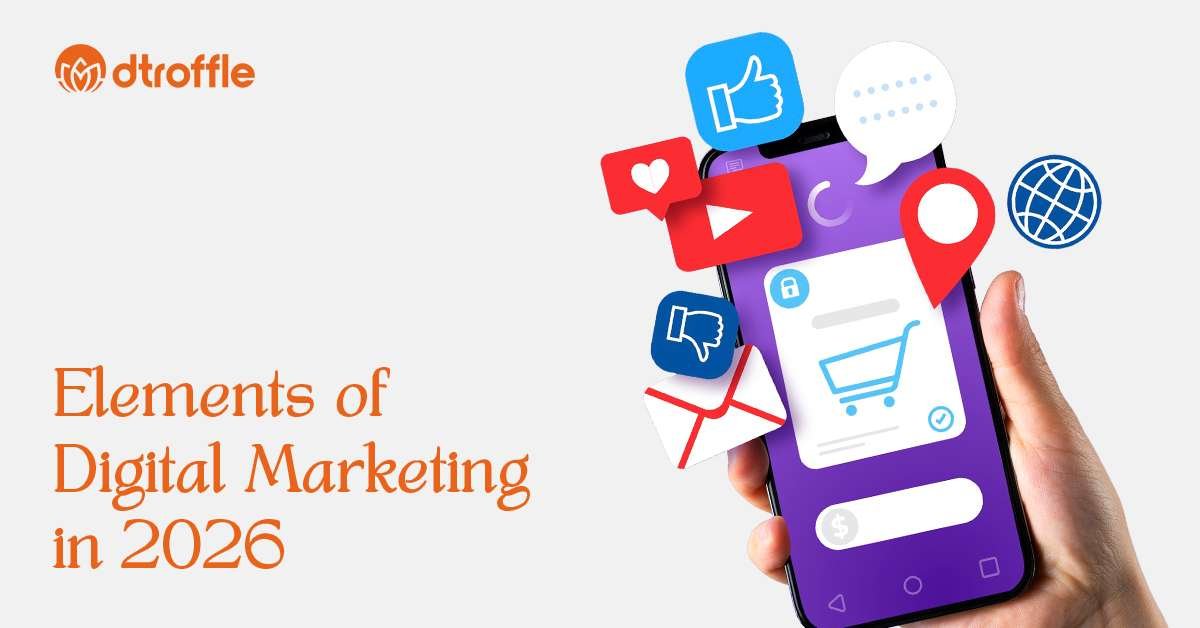The essential elements of digital marketing include strategies such as search engine optimization (SEO), content development, social media engagement, email outreach, pay-per-click (PPC) campaigns, affiliate collaborations, branding, ORM, and mobile-focused promotions. When these methods are combined, they create a unified approach that helps brands strengthen online visibility and foster meaningful interactions with their target audience. Supporting factors such as analytics, automation tools, and a clear understanding of the customer base further enhance these efforts, ensuring that all activities contribute to achieving business objectives.
Top 10 Core Elements of Digital Marketing
- Search Engine Optimization (SEO): Improving a website’s design, structure, and content to achieve higher rankings in search results, leading to more organic traffic.
- Content Marketing: Producing and sharing valuable resources-such as articles, videos, or infographics that educate audiences and build long-term trust.
- Social Media Marketing (SMM): Using platforms like Instagram, LinkedIn, or Facebook to engage with communities, strengthen brand identity, and promote products or services.
- Email Marketing: Sending personalized email campaigns to nurture leads, encourage repeat customers, and highlight offers or announcements.
- Pay-Per-Click (PPC) Advertising: Running targeted paid campaigns where businesses are charged only when users click on their ads.
- Affiliate Marketing: Partnering with affiliates who promote your offerings in exchange for a commission on successful sales or leads.
- Mobile Marketing: Designing campaigns specifically for mobile audiences through SMS, app promotions, and mobile-friendly ads.
- Branding: Establishing a consistent identity, tone, and visual style that communicates the values and personality of a business, helping it stand out in the marketplace.
- Online Reputation Management (ORM): Monitoring and shaping how a brand is perceived online by responding to reviews, addressing negative content, and fostering positive engagement.
- Influencer Marketing: Collaborating with influential personalities who have strong online followings to promote products, increase reach, and build credibility.
1. Search Engine Optimization (SEO)
Search Engine Optimization, widely referred to as SEO, is one of the most critical elements of digital marketing. It involves a set of practices aimed at improving a website’s visibility in search engine results, ultimately driving more organic (unpaid) traffic. By aligning content and technical aspects of a website with search engine algorithms, businesses can enhance their chances of appearing in front of users who are actively searching for related products, services, or information.
Key aspects of SEO include:
- Keyword Research: The process of identifying the words and phrases that users type into search engines. A strong keyword strategy ensures that content is created to match user intent and attract qualified visitors.
- On-Page Optimization: Refining individual web pages by optimizing titles, headers, meta descriptions, images, and content structure to make them more search-friendly.
- Off-Page Optimization: Building credibility through backlinks from authoritative websites, brand mentions, and other external signals that increase trustworthiness in the eyes of search engines.
- Technical SEO: Addressing behind-the-scenes elements such as site speed, mobile responsiveness, crawlability, and secure connections (HTTPS), all of which influence rankings.
- Content Development: Publishing high-quality, informative, and keyword-optimized content that provides value to users while improving search relevance.
- User Experience (UX): Ensuring that visitors can easily navigate the site, find information quickly, and have a positive overall experience-factors that indirectly support SEO performance.
- Local SEO: Optimizing online presence for location-based searches to help businesses connect with customers in specific geographic areas, often through tools like Google Business Profile.
- Performance Monitoring: Regularly tracking website analytics, monitoring keyword rankings, and making data-driven adjustments to refine SEO strategies over time.
2. Content Marketing
Content Marketing is another top elements of Digital Marketing, and it is a strategic approach to digital marketing that focuses on producing and sharing valuable, relevant, and engaging information with a clearly defined audience. Instead of directly selling products or services, the goal of content marketing is to build trust, strengthen brand authority, and foster long-term relationships with potential and existing customers. High-quality content not only educates and informs but also drives engagement and supports other digital marketing channels such as SEO, social media, and email marketing.
Key aspects of Content Marketing include:
- Content Strategy: Outlining clear objectives, identifying the target audience, and determining which types of content (blogs, videos, eBooks, infographics, etc.) will be most effective in achieving business goals.
- Content Creation: Developing original and meaningful materials that address audience needs, answer questions, and provide solutions while maintaining a consistent brand voice.
- Content Distribution: Sharing content across multiple channels-including websites, social media platforms, newsletters, and third-party publications-to maximize reach.
- Audience Engagement: Encouraging interaction through comments, discussions, shares, and feedback to build a loyal community around the brand.
- SEO Integration: Using relevant keywords, optimizing content structure, and applying on-page SEO techniques to increase visibility in search engines.
- Content Repurposing: Transforming existing content into new formats-for example, turning a blog into a video, infographic, or podcast-to extend its lifespan and audience reach.
- Performance Measurement: Analyzing metrics such as website traffic, time spent on content, social shares, and lead generation to evaluate effectiveness and refine strategies.
3. Social Media Marketing (SMM)
Social Media Marketing (SMM) is a powerful branch of digital marketing that leverages social platforms to build brand awareness, engage with audiences, and drive business growth. Through platforms such as Facebook, Instagram, LinkedIn, YouTube, and X (formerly Twitter), businesses can connect directly with customers, share content, and foster meaningful relationships. Beyond simply posting updates, effective SMM requires strategic planning, targeted campaigns, and continuous engagement to ensure that a brand remains visible and relevant in a highly competitive online space.
Key aspects of Social Media Marketing include:
- Platform Selection: Choosing the right social networks based on where the target audience is most active and engaged.
- Content Planning: Designing a content calendar that balances promotional posts, educational material, storytelling, and interactive content to maintain audience interest.
- Community Engagement: Actively responding to comments, messages, and mentions to build trust and strengthen customer relationships.
- Paid Social Advertising: Running targeted ad campaigns to reach specific demographics, increase brand exposure, and generate leads or conversions.
- Influencer Collaborations: Partnering with social media influencers whose audience aligns with the brand to expand reach and credibility.
- Analytics and Insights: Monitoring performance metrics such as engagement rates, impressions, reach, and conversions to evaluate campaign success and refine strategies.
- Brand Voice and Consistency: Maintaining a consistent tone, style, and visual identity across all social platforms to reinforce brand recognition.
- Trend Adaptation: Staying updated with social media trends-such as short-form video, interactive polls, and live streaming-to remain relevant and maximize engagement.
4. E-mail Marketing
Email Marketing is one of the most effective and cost-efficient elements of digital marketing, enabling businesses to communicate directly with their audience through personalized messages. Unlike many other channels, email provides a direct line to customers’ inboxes, making it an excellent tool for nurturing leads, retaining existing clients, and driving conversions. With the right strategy, businesses can use email to build long-term relationships, provide value, and guide customers through the sales funnel.
Key aspects of Email Marketing include:
- Audience Segmentation: Dividing subscribers into smaller groups based on demographics, behavior, or preferences to deliver highly targeted messages.
- Personalization: Using customer data to tailor subject lines, content, and offers that resonate with individual subscribers.
- Content Design: Crafting engaging emails that include compelling copy, visuals, and calls-to-action to encourage readers to take the desired step.
- Automation: Setting up automated workflows such as welcome emails, abandoned cart reminders, and follow-up sequences to streamline customer communication.
- Campaign Types: Running different types of campaigns, including newsletters, promotional offers, event invitations, or product updates.
- Compliance and Deliverability: Ensuring emails meet regulations such as GDPR or CAN-SPAM while maintaining strong sender reputation for better inbox placement.
- Performance Tracking: Measuring key metrics like open rates, click-through rates, conversions, and unsubscribe rates to optimize future campaigns.
- Integration with Other Channels: Aligning email marketing with social media, SEO, and content strategies for a more cohesive digital presence.
5. Pay-Per-Click (PPC) Advertising
Pay-Per-Click (PPC) advertising is a digital marketing strategy where businesses pay a fee each time a user clicks on one of their ads. Instead of earning traffic organically, PPC allows companies to buy visibility on search engines and social platforms, making it a highly effective method for generating leads quickly. Well-structured PPC campaigns can place businesses in front of potential customers at the exact moment they are searching for related products or services, which significantly increases the likelihood of conversions.
Key aspects of PPC Advertising include:
- Campaign Setup: Creating campaigns on platforms like Google Ads, Bing Ads, Facebook Ads, or LinkedIn Ads, tailored to business objectives.
- Keyword Targeting: Selecting and bidding on relevant keywords that match user intent, ensuring ads appear to the right audience.
- Ad Copy and Design: Crafting compelling ad headlines, descriptions, and visuals that attract clicks and drive engagement.
- Audience Targeting: Refining campaigns by selecting demographics, interests, behaviors, and geographic locations to reach specific customer groups.
- Budget Management: Allocating ad spend strategically to maximize ROI while keeping costs under control.
- Quality Score Optimization: Improving ad relevance, click-through rate, and landing page experience to achieve better ad placements at lower costs.
- Remarketing: Targeting users who have already interacted with a website or product, reminding them to complete their purchase or engage further.
- Performance Tracking: Monitoring metrics such as impressions, clicks, cost-per-click (CPC), and conversion rates to optimize campaigns continuously.
6. Affiliate Marketing
Affiliate Marketing is a performance-based digital marketing strategy in which businesses collaborate with third-party partners, known as affiliates, who promote their products or services in exchange for a commission. This model benefits both sides: affiliates earn income by driving sales or leads, while businesses expand their reach and customer base without upfront advertising costs. As one of the key elements of digital marketing, affiliate marketing allows companies to leverage the influence and promotional efforts of affiliates to tap into new audiences and strengthen brand visibility.
Key aspects of Affiliate Marketing include:
- Affiliate Partnerships: Collaborating with individuals, bloggers, content creators, or websites that have audiences aligned with the brand’s offerings.
- Commission Structures: Defining clear payout models, such as cost-per-sale (CPS), cost-per-click (CPC), or cost-per-lead (CPL), based on desired outcomes.
- Tracking and Attribution: Using affiliate links, tracking codes, and cookies to accurately monitor performance and reward affiliates for their contributions.
- Affiliate Networks: Partnering through established platforms that connect businesses with a wide pool of affiliates, simplifying recruitment and management.
- Content Promotion: Encouraging affiliates to use blogs, social media, email campaigns, or videos to promote products authentically.
- Compliance and Transparency: Ensuring affiliates disclose their partnerships and follow ethical guidelines to maintain trust with consumers.
- Performance Monitoring: Continuously evaluating affiliate performance through metrics such as sales volume, conversion rates, and return on investment (ROI).
- Brand Alignment: Selecting affiliates whose values and audience demographics align with the brand’s identity to ensure consistent messaging.
7. Mobile Marketing
Mobile Marketing is a vital component of the broader elements of digital marketing that focuses on reaching audiences through smartphones, tablets, and other mobile devices. As mobile usage continues to dominate online activity, businesses must optimize their strategies to engage customers where they spend most of their time. Mobile marketing ensures that promotional efforts are tailored for smaller screens, fast-loading content, and user-friendly navigation, making the customer experience seamless and accessible anytime, anywhere.
Key aspects of Mobile Marketing include:
- SMS and MMS Campaigns: Sending promotional offers, reminders, or alerts directly to users via text or multimedia messages.
- Mobile Applications: Developing branded apps that provide value to customers through convenience, personalization, and interactive features.
- Mobile-Friendly Websites: Ensuring websites are responsive, fast, and easy to navigate on smartphones and tablets.
- In-App Advertising: Displaying targeted ads within third-party mobile applications to reach active and engaged audiences.
- Location-Based Marketing: Using GPS and geotargeting to deliver personalized offers or notifications to users based on their location.
- Push Notifications: Sending real-time updates or promotions through mobile apps to keep customers engaged and informed.
- Voice Search Optimization: Adapting content for voice commands, as mobile users increasingly rely on virtual assistants like Siri, Alexa, or Google Assistant.
- Analytics and Insights: Tracking mobile user behavior, app downloads, session times, and engagement to refine campaigns and improve performance.
8. Branding
Branding is the process of creating a unique identity for a business that distinguishes it from competitors and builds lasting recognition among customers. As one of the essential elements of digital marketing, branding goes beyond just a logo or slogan; it encompasses the overall perception of a company across all online touchpoints. A strong brand not only communicates a business’s values and personality but also creates emotional connections with its audience, leading to trust, loyalty, and long-term customer relationships.
Key aspects of Branding include:
- Brand Identity: Developing visual elements such as logos, color schemes, fonts, and design styles that consistently represent the brand.
- Brand Voice and Messaging: Establishing a consistent tone, style, and language across all communications to reflect the brand’s personality.
- Value Proposition: Clearly communicating what sets the brand apart and why customers should choose it over competitors.
- Consistency Across Channels: Ensuring that websites, social media platforms, ads, and emails all convey the same brand image and message.
- Emotional Connection: Building a relationship with customers by aligning brand values with customer expectations and lifestyle.
- Customer Experience: Delivering a seamless and positive experience at every digital interaction, reinforcing brand trust.
- Reputation Management: Monitoring and guiding how the brand is perceived online to maintain a positive public image.
- Brand Storytelling: Using narratives, visuals, and campaigns to convey the brand’s journey, mission, and purpose in a relatable way.
9. Online Reputation Management (ORM)
Online Reputation Management (ORM) is the practice of monitoring, influencing, and maintaining how a brand, business, or individual is perceived on the internet. In today’s digital-first world, customer opinions and online conversations can significantly impact a company’s credibility and success. ORM ensures that positive content is highlighted, negative feedback is addressed, and overall trust in the brand is reinforced. A strong reputation not only attracts new customers but also strengthens loyalty among existing ones.
Key aspects of ORM include:
- Monitoring Brand Mentions: Tracking conversations, reviews, and comments across search engines, social media platforms, and review websites.
- Review Management: Encouraging satisfied customers to leave positive reviews while responding professionally and promptly to negative feedback.
- Crisis Response: Handling unfavorable publicity or online criticism with a proactive and transparent communication strategy.
- Search Engine Results Optimization: Promoting positive content and pushing down harmful or misleading information in search rankings.
- Social Media Engagement: Actively interacting with followers, addressing concerns, and showcasing responsiveness to build trust.
- Content Development: Publishing blogs, press releases, and social media posts that highlight the brand’s strengths and successes.
- Transparency and Authenticity: Demonstrating honesty in communication and acknowledging mistakes to maintain credibility.
- Analytics and Reporting: Measuring sentiment, review ratings, and brand mentions to evaluate reputation health and make improvements.
10. Influencer Marketing
Influencer Marketing is a digital marketing strategy that involves partnering with individuals who have established credibility and a strong following on social media or other online platforms. As one of the growing elements of digital marketing, this approach leverages influencers—ranging from celebrities to niche content creators-who can sway the opinions and purchasing decisions of their audience. By collaborating with the right influencers, businesses can expand their reach, increase brand awareness, and build trust with target customers through authentic recommendations.
Key aspects of Influencer Marketing include:
- Influencer Identification: Selecting influencers whose audience, values, and content align with the brand’s goals and identity.
- Partnership Models: Structuring collaborations through sponsorships, product placements, affiliate partnerships, or long-term ambassadorships.
- Content Collaboration: Working with influencers to create authentic, engaging content-such as videos, reviews, stories, or tutorials, that resonates with their audience.
- Audience Targeting: Leveraging the influencer’s community to reach specific demographics and niche markets effectively.
- Trust and Credibility: Relying on the influencer’s reputation to build customer confidence and drive purchase decisions.
- Campaign Measurement: Tracking engagement rates, reach, conversions, and ROI to evaluate the success of influencer partnerships.
- Micro vs. Macro Influencers: Choosing between smaller influencers with highly engaged audiences and larger influencers with broader visibility, depending on campaign objectives.
- Compliance and Transparency: Ensuring that influencers disclose partnerships according to advertising guidelines to maintain authenticity and trust.
Partner With Dtroffle for Complete Digital Marketing Solution for Your Brand
Looking for a trusted digital marketing partner? Dtroffle, a leading digital marketing agency in Agra, is your one-stop solution for all the key elements of digital marketing. From SEO, Content Marketing, Social Media, Email, PPC, and Affiliate Marketing to Mobile Marketing, Branding, ORM, and Influencer Marketing, we cover it all under one roof. Our expert team designs strategies that boost online visibility, build strong brand presence, and deliver measurable results. With Dtroffle, growing your business in the digital world becomes simple and effective.





